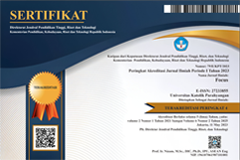Archives
-
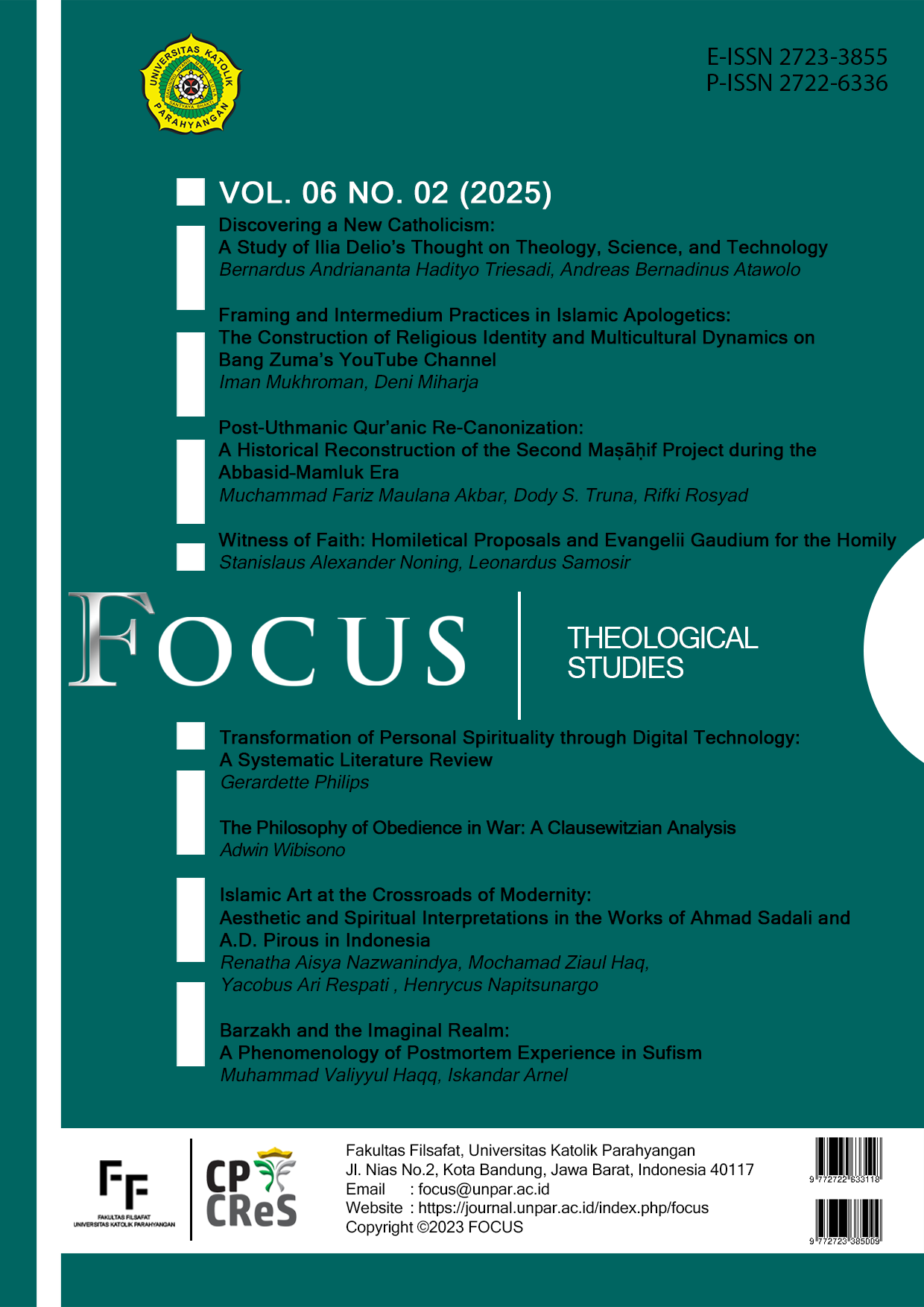
Focus
Vol. 6 No. 2 (2025)FOCUS Vol. 6 No. 2 (2025) presents eight research articles that critically explore the intersections of religion, theology, culture, technology, and socio-political dynamics across diverse religious and intellectual contexts. This edition foregrounds key theological and philosophical questions arising from modernity, digital transformation, and global pluralism, while maintaining strong attention to historical inquiry and lived religious experience. Collectively, the contributions demonstrate how religious thought and practice are being reinterpreted and reformulated in response to rapid social, cultural, and technological change.
The articles engage themes ranging from theology–science dialogue, digital spirituality, and ethical reflections on obedience and war, to religious identity construction through media, Qur’anic history, homiletics, Islamic art, and Sufi phenomenology. This issue features eight articles written by 17 contributors from Indonesia, Italy, and Türkiye, affiliated with seven academic and religious institutions, including Sekolah Tinggi Filsafat Driyarkara, Universitas Sultan Ageng Tirtayasa, UIN Sunan Gunung Djati Bandung, Universitas Katolik Parahyangan Bandung, Formation Religieuses du Sacré-Cœur de Jésus (Rome), Ibn Haldun University (Türkiye), and UIN Sultan Syarif Kasim Riau. Together, these contributions reaffirm FOCUS’s commitment to advancing rigorous, interdisciplinary, and context-sensitive scholarship on religion within contemporary global transformations.
-

Focus
Vol. 6 No. 1 (2025)FOCUS Vol. 6 No. 1 (2025) presents eight articles exploring the intersections of religion, culture, and social dynamics in Indonesia and Southeast Asia. This edition examines the role of the Sacrament of Confirmation in shaping missionary vocation among Catholics, the contribution of religion to regional peacebuilding, and rahmatan lil alamin as a global ethical framework in education. It also highlights moral development in pesantren through the Yellow Book tradition, the integration of Amaedola culture in Catholic pastoral care in Nias, and shifting community participation in the Ngarot ritual. Further discussions include the political theology of BIWALI pesantren during the 2024 elections and reflexive ethnographic practices within the sacred context of the Baduy community. Altogether, these articles emphasize the need for contextualizing faith amid ongoing social transformation.
This edition features eight articles written by 17 contributors representing four countries—Indonesia, Brunei Darussalam, Malaysia, and Japan. The contributors consist of 13 authors from Indonesia, 2 from Brunei Darussalam, 1 from Malaysia, and 1 from Japan. They are affiliated with seven academic institutions: Parahyangan Catholic University, UIN Sunan Gunung Djati Bandung, Sultan Sharif Ali Islamic University (Brunei Darussalam), Universiti Teknologi MARA (UiTM) Malaysia, Sultan Ageng Tirtayasa University (UNTIRTA), Gadjah Mada University (UGM), and Hokkaido University (Japan).
-
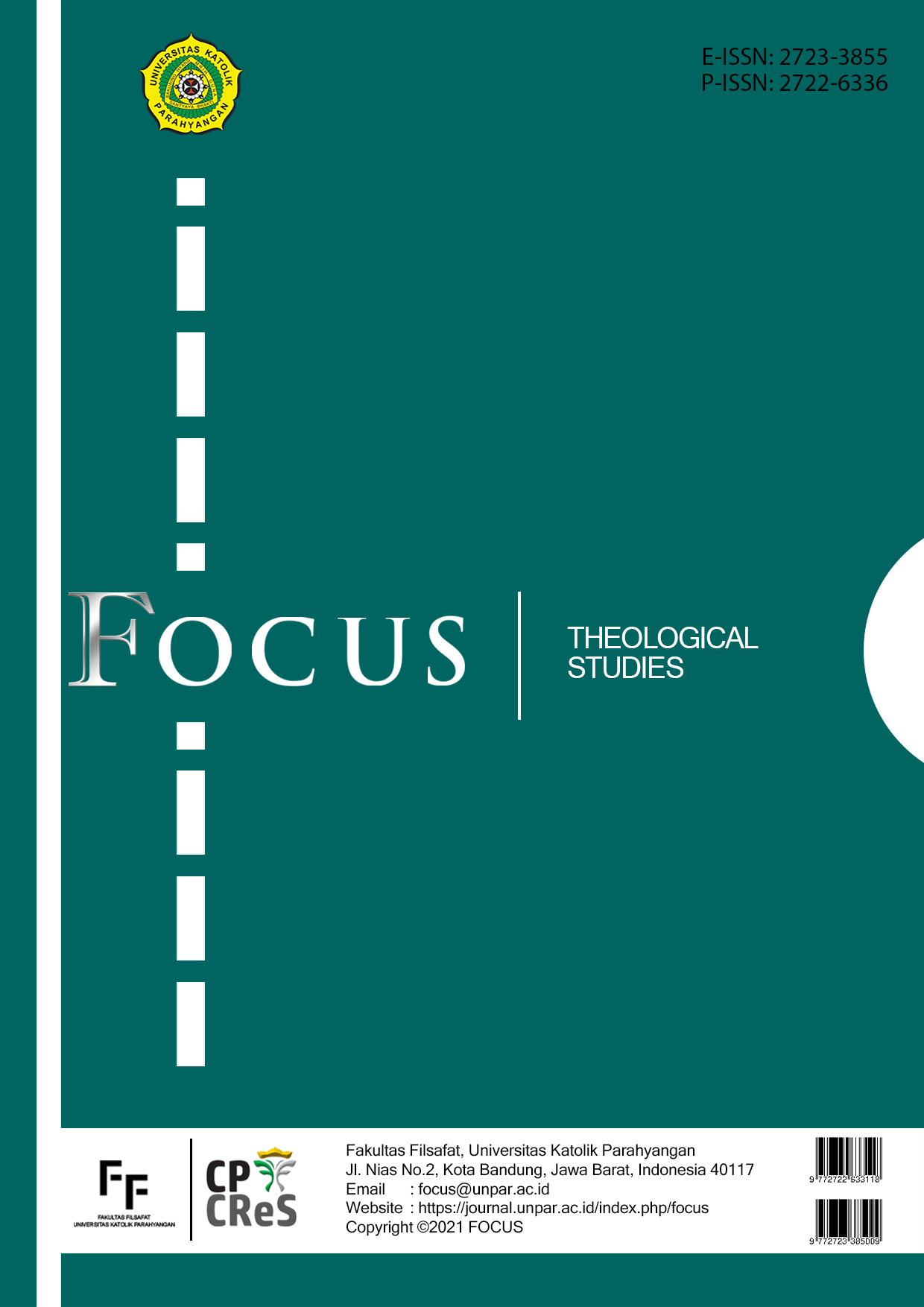
Focus
Vol. 5 No. 2 (2024)FOCUS Vol. 5 No. 2 (2024) explores the interplay between tradition, modernity, and pastoral challenges within the Catholic Church and broader religious contexts. This edition highlights discussions on fostering a more hospitable Church through the ecclesiological perspectives of Bernard Lonergan and Peter C. Phan, addressing the relevance of reconciliation sacraments in modern times, and maintaining order in religious worship from Goffman’s viewpoint. Holistic approaches to guiding Catholic youth in balancing spiritual and worldly life, the historical and doctrinal significance of charisma in the Church, and the understanding and practice of the anointing of the sick in hospitals provide practical insights. Articles also examine John Paul II’s Theology of the Body in navigating contemporary crises of body and sexuality, alongside a study of cultural unity and compassion among priest candidates at Fermentum Major Seminary, underscoring the importance of inclusivity and adaptability in nurturing faith communities.
-
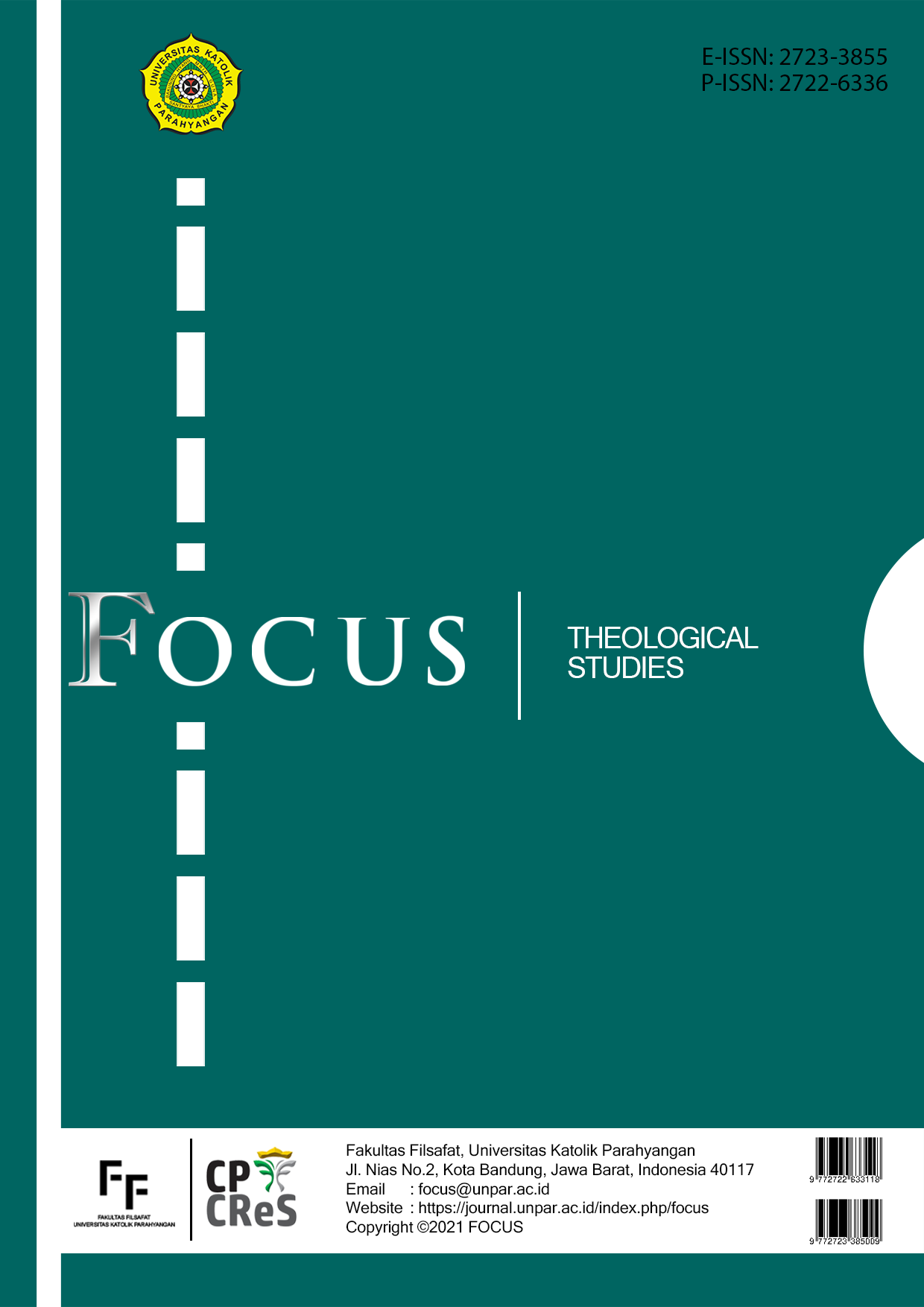
Focus
Vol. 5 No. 1 (2024)FOCUS Vol. 5 No. 1 (2024) delves into the evolving intersections of religion, culture, and modernity, emphasizing their roles in shaping societal progress and harmony. This edition includes discussions on Nahdlatul Ulama's contribution to building a new era civilization, the application of cultural values and their societal impacts, and the renewal and reformation of Islam in contemporary contexts. Articles on gender and feminism from an Islamic perspective, the development of Islamic puritanism and Wahhabism, and the concept of multiculturalism within Muhammadiyah’s progressive ideology further enrich the discourse. Additionally, the edition explores the Church’s role in fostering social communication through the decree Inter Mirifica, the transformation of Piring dance from a religious expression to an economic commodity, and the exploration of spirituality through modern art and festivals, highlighting the adaptability of tradition in an ever-changing world.
-
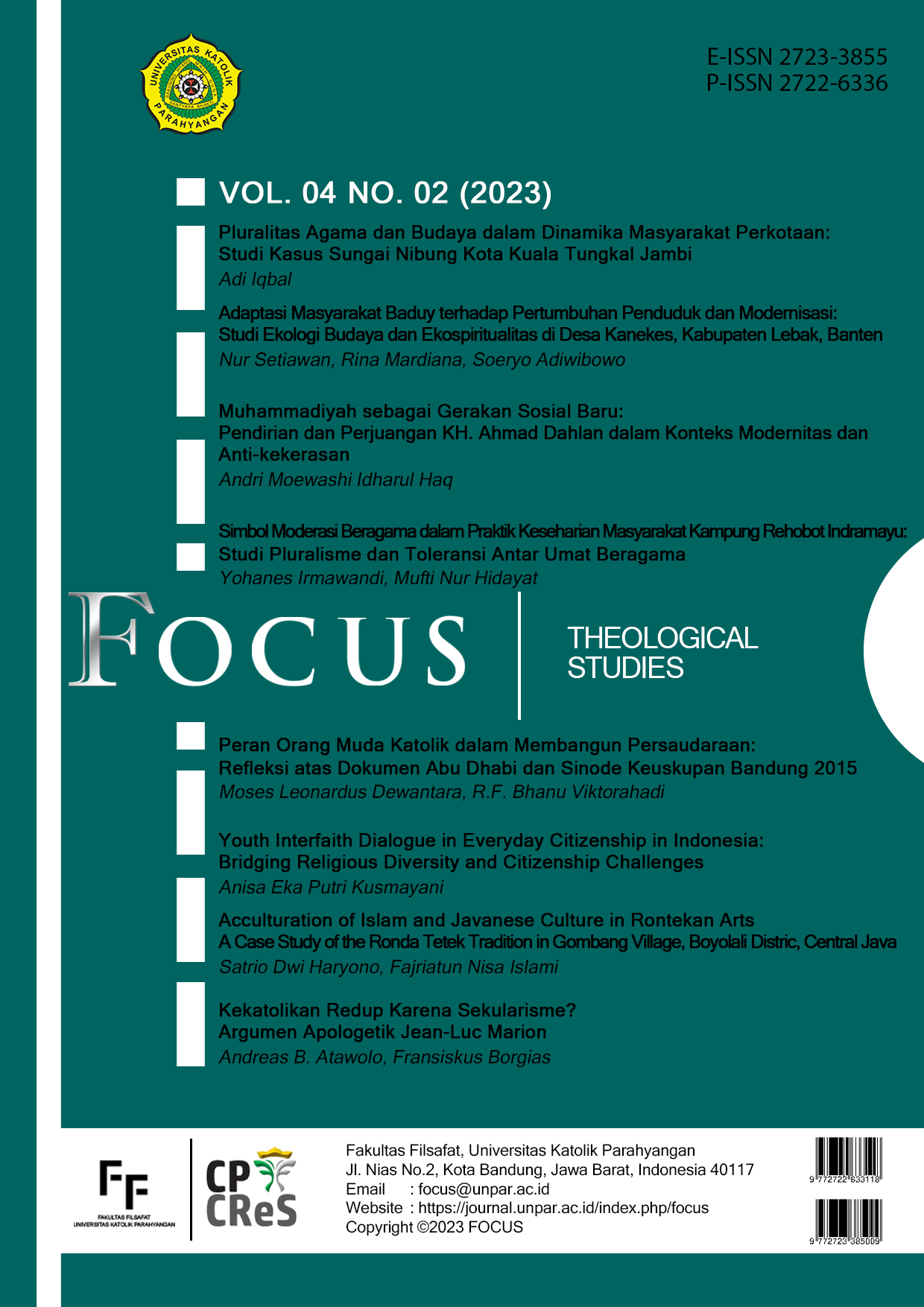
Focus
Vol. 4 No. 2 (2023)FOCUS Vol. 4 No. 2 (2023) explores the dynamics of religion and culture in diverse societal contexts, highlighting issues such as pluralism, modernity, and spiritual adaptation. This edition includes studies on religious coexistence in Sungai Nibung, the Baduy community's response to modernization, and Muhammadiyah's role as a nonviolent social movement led by KH. Ahmad Dahlan. Symbols of religious moderation in Kampung Rehobot, youth interfaith dialogues in Indonesia, and reflections on Catholic youth initiatives inspired by the Abu Dhabi Document and Bandung Synod 2015 further enrich the discourse. The acculturation of Islam and Javanese culture through Rontekan arts in Boyolali and Jean-Luc Marion's apologetic argument on Catholicism amid secularism underline the importance of fostering harmony, inclusivity, and cultural resilience in pluralistic societies.
-

Focus
Vol. 4 No. 1 (2023)FOCUS Vol. 4 No. 1 (2023) examines the role of religion and culture in shaping individual and societal behaviors, with an emphasis on fostering harmony and addressing challenges in contemporary contexts. This edition features studies on the contributions of religious leaders to adolescent behavioral education and the use of social media in countering radicalism and promoting religious moderation. Other articles explore the mediatisation of Islamic and Christian values through platforms like YouTube, the role of Quranic recitation in achieving inner peace, and the stigmatization of women smokers in patriarchal cultures. Theological perspectives from Bernard Lonergan and Avery Dulles on doctrinal development, the concept of intercultural society in addressing diversity, and Catholic views on conflict of interest in Indonesia further highlight the importance of inclusivity, ethical integrity, and spiritual grounding in navigating modern societal complexities.
-
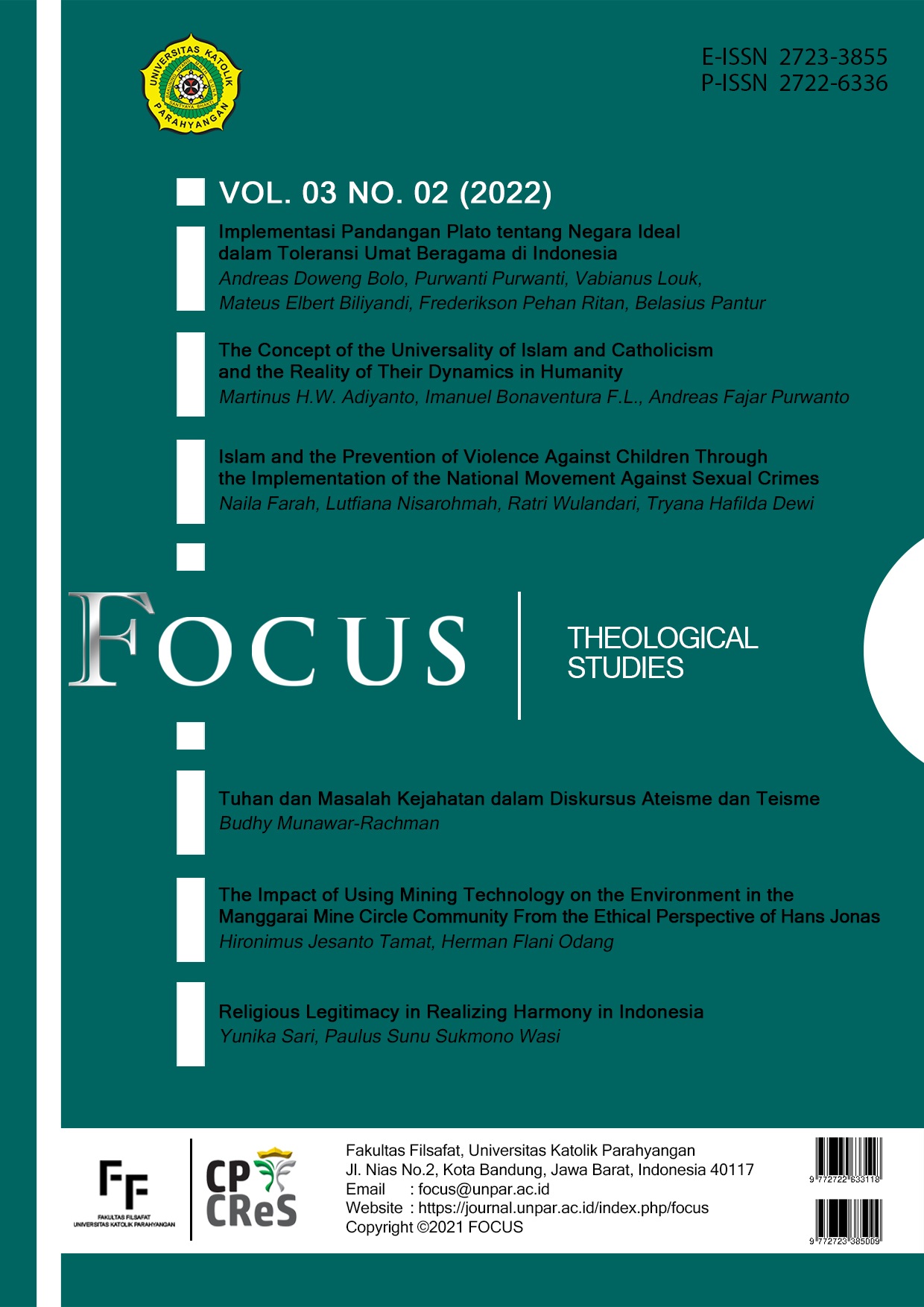
Focus
Vol. 3 No. 2 (2022)FOCUS Vol. 3 No. 2 (2022) publishes scientific articles on the relationship between religion and contemporary human pluralism. We can observe that the plurality of life is a necessity and a gift from God. Religion has universal values in caring for human life with different ethnic, racial, intergroup, and national backgrounds. The authors emphasize human freedom in the absence of spirituality, disasters that occur consciously, intolerance, and disharmony that result in human casualties. According to Plato, quality humans can maintain harmony in state and religious life. But according to Hans Jonas, place where humans live is the future of all living things. Therefore, human freedom to raise awareness, and an inclusive religious attitude is one of the efforts to avoid harmful conflicts.
-

Focus
Vol. 3 No. 1 (2022)FOCUS Vol. 3 No. 1 (2022) focuses on the epistemological question of analyzing thoughts on Islamic Law, Sufism, Eschatology, liberalization of human intellectual existence, and even liberation from colonialism. These topics explore religion and religiosity from various disciplines and methods, such as phenomenology, history, philosophy, and Sufism. For example, liberation from colonialism cannot be separated from human sacrifice. Human sacrifice is connected with belief in life after death (eschatology), as believed in various religions and beliefs. However, in the name of religion and belief, it can manifest different reactions to the integrity of national unity with diverse ethnic backgrounds.
-
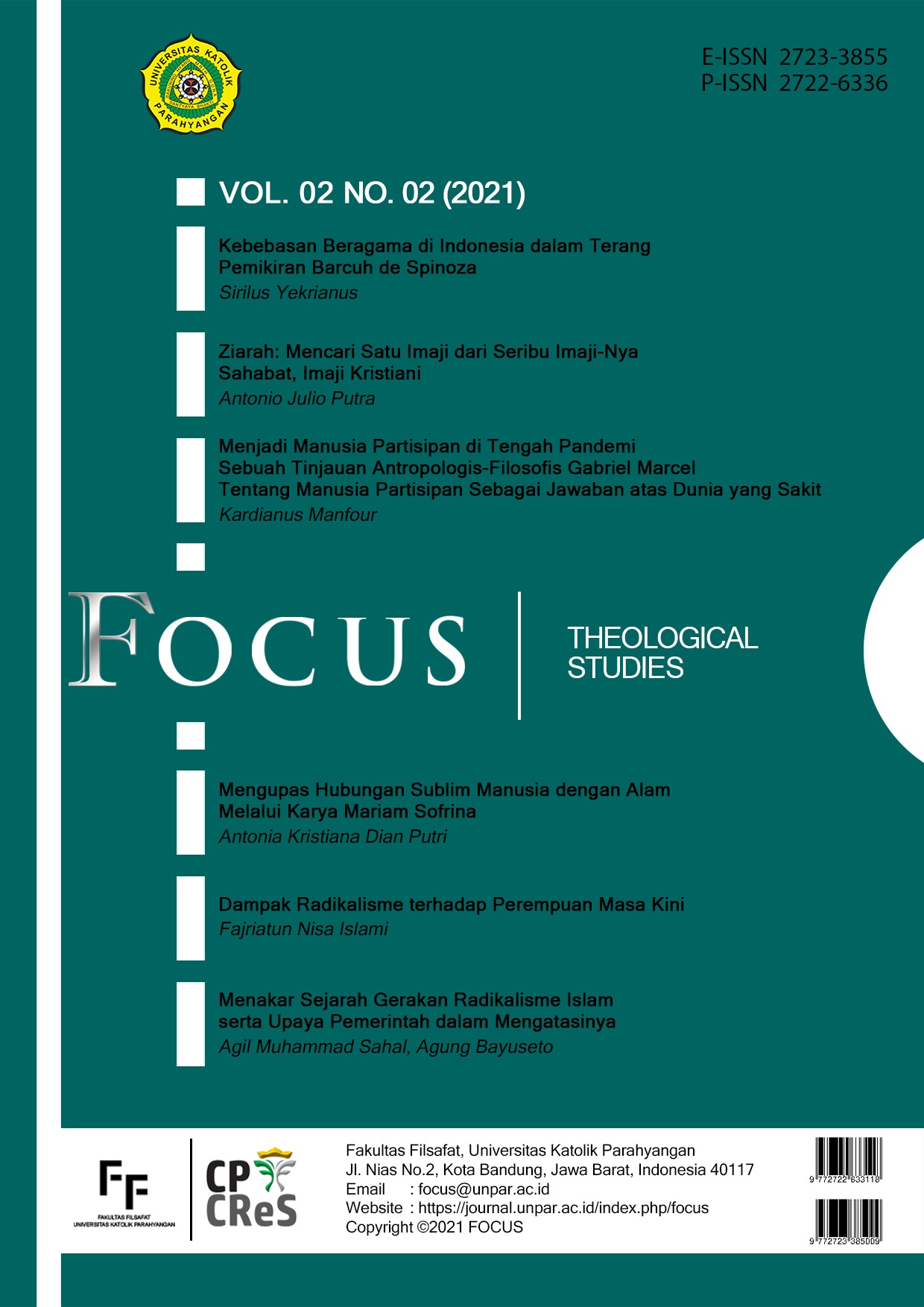
Focus
Vol. 2 No. 2 (2021)FOCUS Vol. 2 No. 2 (2021) reflects on human existence and experience. Gabriel Marcel's philosophical concept seeks to understand human existence. Spinoza highly valued reason. He outlined the importance of religious freedom as a human choice. Humans who are aware of their social responsibilities always have a heart towards others and the world. This kind of human respects the mind and freedom of other humans. Practically, humans must try to face threats to their lives. For example, radicalism and discriminatory treatment. Therefore, humans should rethink their relationship with God and nature. He had to rethink his policies towards other humans. According to Mariam Sofrina, humans will be able to be introduced and reconnected to their noble virtues. This edition of FOCUS Theological Studies is like a pilgrimage of human intellectual and spirituality to find the Transcendent, in the name of faith and humanity.
-

Focus
Vol. 2 No. 1 (2021)FOCUS Vol. 2 No. 1 (2021). The focal point of the discussion of this research is the relevance of Jean-Jacques Rousseau’s thoughts to online lectures. The basic concept of education according to Rousseau lies in forming free, independent human beings without pressure or bondage, not for a particular purpose. In other words, freedom is the basic law of education. Education covers science and technology. Science, technology, that now tends to be materialistic, offers humans how to get a truth. It is ironic that such science, tends to reduce other factors that already exist in the world of human understanding. As a result, with all its ambitions, science tries to convince humans that some of its fundamental beliefs are a deception. But in fact science, technology has limitations in explaining the truth. This limitation is often closed tightly with opinions so that humans lead to dryness of understanding. There is an effort, more useful to view life or other basic understanding is more lively.
-
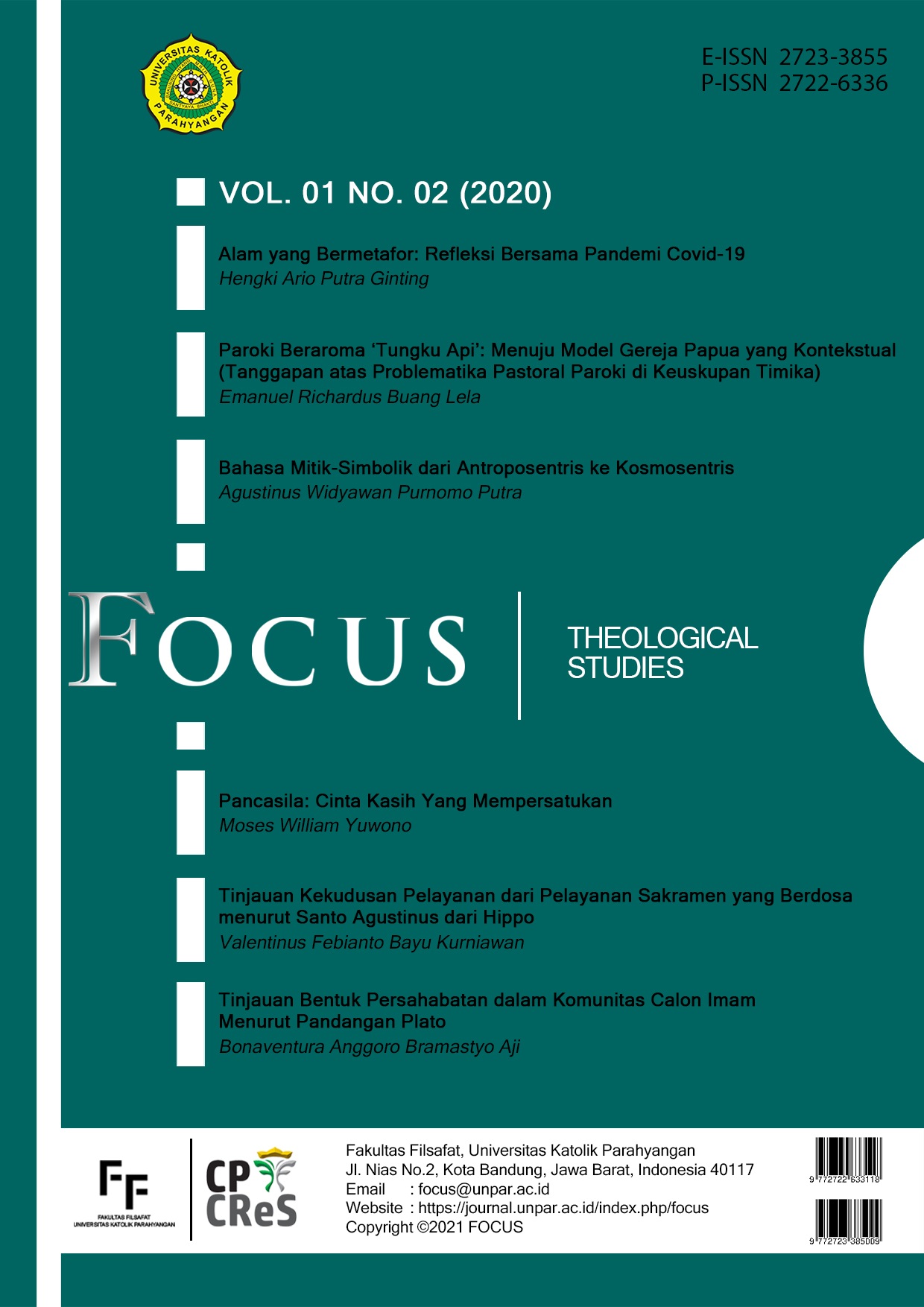
Focus
Vol. 1 No. 2 (2020)FOCUS Vol. 1 No. 2 (2020) observes that plague is not something strange in the story of human civilization. Nevertheless, the plague has always succeeded in delivering dynamic of humanity to the frightening crisis. At least, in his comment about the pandemic Covid-19, Yuval Noah Harari said that pandemic Covid-19 which we are facing right now has dropped almost all sectors in the world to the most crisis moment in its own generation. It is really possible to say this condition is capable enough to make humanity in trouble. In that condition as homo religiosus, human being is always looking for the meaning of life, theirs existence, and also the mysteries of the universe. As time goes by, human being only focus for their self-fullness and self-centeredness and in the end human have lost connected with the ultimate reality in which they can get their bearing. Instead of searching for a meaning, man is becoming completely alienated from himself as a being, from the others, and from the transcendental things. In this era, it is important to have a new perspective and world view about human being itself in the universe.
-
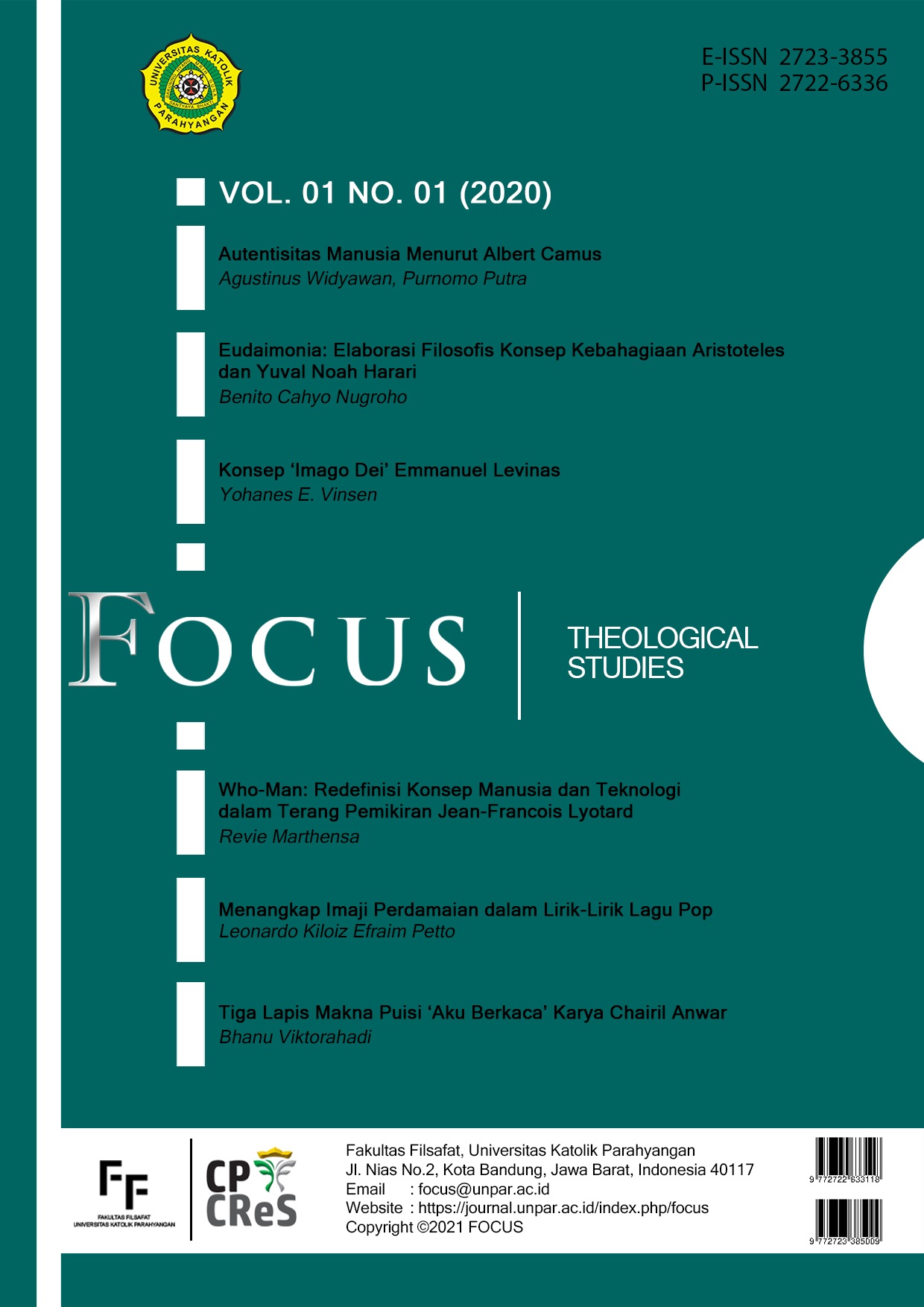
Focus
Vol. 1 No. 1 (2020)FOCUS Vol. 1 No. 1 (2020) observes that One’s Identity is a vital component of a human life. Identity is important, especially considering when oneself is sometimes subjected to the judgment of others. Identity makes a human life grasps its humanity. Humanity is unable to achieve grasp over the world so filled with mysteries. As a result, his life becomes limited. Although humanity continues to hope, his limitations however see to it that human hope can crumble at any given moment. Based on these facts, human life becomes an absurdity. The absurdity of life throws man into an existence of the incomprehensible mystery of life. One of the mystery of life is happiness. Ever has man sought happiness to enrich his days, to such lengths that twould not be an understatement to state happiness is his life’s goal. Happiness possesses an internal dimension, wrought once one lives a wholesome existence in concord to ones vocation.

